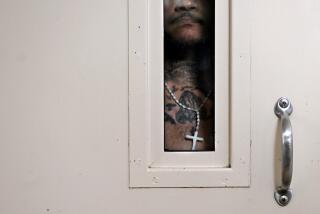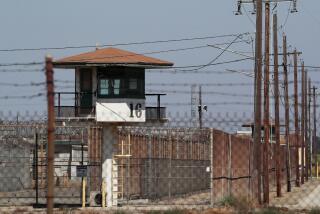California prisons on soft lockdown; prison nurses must work overtime, or else
California has launched a 14-day statewide soft lockdown in its prisons amid the coronavirus and told exhausted prison nurses that if they’re ordered to work 16-hour shifts, they must comply or face reprisal.
Inmates will be fed in their cells but still given access to prison services, exercise yards, supply canteens and phone calls within their own housing groups, the California Department of Corrections and Rehabilitation said Tuesday.
“For the next 14 days,” CDCR Secretary Ralph Diaz said in a prepared statement, “there are going to be a lot of changes within our institutions, but we do it with the overall health and safety of all those who live and work in them, and the health and safety of the public, at the forefront.”
The prison system, which had mandated use of N95 masks only around confirmed COVID-19 patients, has relaxed restrictions and will allow prison workers to bring in their own masks and face coverings for more widespread use. They still are saying the state-issued respirator masks should be reused while on rounds, noting “there is not an exact determination on the number of safe reuses.”
These steps — in addition to the previous curtailment of visitation, gate screening and temperature checks of employees, and planned early release of some 3,500 inmates — come as three federal judges scrutinize whether more drastic measures are required at the prisons.
One of the judges, U.S. District Judge Jon Tigar, has asked the state to report whether it can triple the early releases, freeing inmates as much as six months before the end of their sentence. A response is due Friday. Another judge, U.S. District Judge Kimberly Mueller, has asked the state to respond to a proposed order to resume admitting inmates into state psychiatric hospitals.
The state shut down psychiatric admissions to limit the spread of the virus, but inmate attorneys say that leaves those who are suicidal or in psychotic crisis without critical care.
Civil rights lawyers have asked the courts for even further action — suggesting mass releases or creation of alternative housing to protect more than 45,000 prisoners with known health risks that would make them more vulnerable to severe illness or death from COVID-19.
Lawyers with the Prison Law Office filed a renewed emergency motion Wednesday evening, seeking court-ordered prison reductions, whether through mass releases, use of alternative housing, “home confinement, electronic monitoring and medical furlough.”
Prison administrators “cannot wait for disaster to strike or the numbers to climb higher,” the motion states. “Their failure to take appropriate remedial steps constitutes deliberate indifference to the profound risk of harm to medically vulnerable people in their custody.”
The latest updates from our reporters in California and around the world
The prison infection rate as of Wednesday had climbed to 81 cases, 19 of them inmates and 62 prison workers, including two nurses from the state medical prison near Stockton. A spokeswoman for the prison system said staff absences due to illness had now climbed to more than 1,100 workers who were out Sunday.
Meanwhile, overtime has become mandatory for some prison medical staff. In a memo sent out April 1, the head of California Correctional Health Care Services informed nurses at prisons statewide that if they were ordered to work extended shifts or to skip their days off, they must do so.
“A refusal to a mandate is insubordination,” Dr. Shereef Aref wrote. “It is not acceptable and it will not be tolerated.”
First refusals will result in a write-up, Arf wrote. “A second refusal will be referred, as a request for Adverse Action, to the Hiring Authority.”
One prison medical worker, who spoke anonymously out of fear of losing her job, said the stress was intense.
“Nursing staff [have] children out of school; to be away 16 hours not including walk time to the parking lot and drive time home could add up to 18 hours a day,” she said. In many cases, both spouses work at the prison. “It’s stressful. There is no such thing as ‘social distancing’ in prison.
“Also, the office staff have masks, but if you go on a housing unit, very few have masks because of the scarcity. … We are confused as to why they seem to have masks for administrative posts.”
She added, “Oh, and an inmate committed suicide yesterday. And two officers committed suicide in March.”
More to Read
Sign up for Essential California
The most important California stories and recommendations in your inbox every morning.
You may occasionally receive promotional content from the Los Angeles Times.












